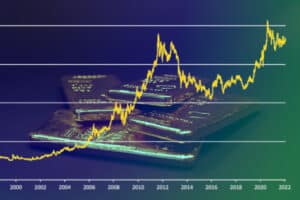The petrodollar system has been the accepted standard for the international oil trade for nearly four decades. However, growing global instability and shifting global powers have allowed challengers to the US Dollar to emerge for the first time since 1975.
Considering how closely tied oil markets are with the rest of the global economy, the decline, or even collapse, of the petrodollar could result in some major global upheaval. Keep reading to learn more about what might be coming and how you can prepare.
What Is The Petrodollar System?
The petrodollar is a term used to describe the global economic system in which oil exports, particularly from Middle Eastern countries, are priced and traded using U.S. dollars.
This system can be traced back to the early 1970s when the United States struggled with growing trade deficits and rising crude oil imports. To maintain global control over oil prices and sustain demand for its currency, U.S. government officials struck a deal with Saudi Arabia, then one of the world’s largest oil producers, requiring countries to buy oil only in U.S. dollars.
This demand not only strengthened the value and influence of the dollar but also helped finance the growing U.S. trade deficit during this period.
What Could Lead To A Full Collapse Of The Petrodollar?
Over time, the Petrodollar system has evolved from an agreement between countries to a global economic system. Not only does it ensure fast, smooth transactions, which are required to keep the oil industry moving, but it is also a major generator of revenue for the United States.
While the system has been in place for several decades, this doesn’t mean that threats to its stability, like the decline in oil production and demand or the emergence of alternative currencies, couldn’t create a major shake-up. Here are a few of the ways that could occur.
Decline In Oil Production And Demand
As the world moves toward more sustainable and renewable energy sources, the demand for petroleum is gradually declining. Technological advances in electric vehicles, solar energy, and various alternative energy solutions are driving this shift. Reduced reliance on petroleum weakens the petrodollar system, as it’s highly dependent on global demand for oil.
The economic downturn and geopolitical tensions have led to a decline in oil consumption in certain regions. As a result, oil-producing countries are receiving fewer petrodollars, limiting their ability to recycle U.S. currency back into the economy.
This trend will likely continue as new energy technologies take hold and further exacerbate instability in the petrodollar system.
Global Shift Towards Alternative Currencies
As the world moves toward more sustainable energy sources, there’s also been a noticeable global movement toward alternative currencies beyond the traditional U.S. dollar. This trend is being driven by a variety of factors, including political tensions, economic sanctions, and the desire for greater financial autonomy.
This dynamic has led countries to explore alternatives to the petrodollar system, including digital currencies, regional trade agreements, and adopting other global reserve currencies, such as the Chinese Yuan and the Euro. As countries diversify their foreign reserves and explore new ways to conduct international trade, the dominance of the petrodollar system may be increasingly challenged.
Political And Economic Sanctions
The United States has consistently used its influence in international organizations such as the United Nations, NATO, and the World Bank to impose economic restrictions against countries it perceives as threats to its interests.
Sanctions against countries such as Russia, Iran, and Venezuela have further accelerated the decline of the petrodollar system. In response to the imposed restrictions, these countries are turning away from oil trade and are seeking alternative methods for conducting international transactions.
Destabilization Of The Middle East
As a key region for global oil production and trade, any destabilization in the Middle East could greatly affect oil prices and demand.
Geopolitical tensions between regions such as Saudi Arabia and Iran have further exacerbated instability. Recent drone attacks on Saudi Arabian oil facilities serve as a reminder of the area’s energy infrastructure vulnerability, causing alarm among investors, governments, and businesses.
These incidents highlight the potential for supply disruptions and their far-reaching consequences on oil prices and the broader economy. In light of this uncertainty, energy-dependent countries and industries must reassess their reliance on the region and seek alternative sources to secure their energy needs.
The Impacts Of A Petrodollar Collapse
The potential collapse of the petrodollar system presents the global community with several serious challenges and implications. Governments, businesses, and individuals must prepare for these potential impacts and develop strategies to adapt to a world without the stabilizing influence of the petrodollar.
Increase In Inflation And Interest Rates
A decline in oil demand could also create unexpected global turbulence due to how it could impact the value of the U.S. dollar.
Considering how much revenue is generated by the dollar’s use in the international oil trade, if it were to be replaced, this could lead to a rapid decline in the dollar’s purchasing power. This would then lead to higher import costs for goods and services, thereby driving up prices and increasing inflation worldwide.
A weaker dollar could also lead to higher commodity prices since most commodities, not just oil, are traded in U.S. dollars. Higher prices would affect various industries and consumers and further increase inflationary pressures. In such a scenario, central banks may be forced to raise interest rates to combat inflation, which could affect borrowing costs, investment, and overall economic growth.
Shift In Global Power And Influence
The potential collapse of the petrodollar system could trigger a major shift in global power dynamics and influence. For decades, the United States maintained its status as the dominant economic superpower, partly because of its status as the world’s reserve currency. The petrodollar system has been a cornerstone of this leadership, creating a constant demand for the dollar through the international oil trade.
However, should the petrodollar lose its value and importance, countries like China and Russia could gain more power and influence on the world stage. These countries are actively working to reduce their dependence on the U.S. dollar, create alternative reserve currencies, and establish new financial institutions to challenge the existing world order.
For example, China has promoted using its currency, the yuan, in international trade and developed the Asian Infrastructure Investment Bank (AIIB) as an alternative to Western-dominated financial institutions. Similarly, Russia has accumulated gold reserves and is working to forge closer ties with other emerging economies to reduce its dependence on the U.S. dollar.
As the petrodollar system weakens, the global balance of power could shift in favor of these alternative economic centers. This shift could lead to a multipolar world in which new alliances and trading partnerships emerge outside the traditional U.S.-dominated influence sphere.
Increase In Geopolitical Tensions
The potential collapse of the petrodollar system could exacerbate existing geopolitical tensions, as countries that rely heavily on oil exports, particularly in the Middle East, would face significant economic and political challenges if they were no longer dependent on the U.S. dollar for trade.
The demise of the petrodollar system could intensify competition for alternative sources of revenue as countries seek to diversify their economies and reduce dependence on oil exports. This could lead to increased competition for other natural resources, potentially leading to territorial disputes and increased tensions between nations.
The weakening of the petrodollar system could also lead to power struggles within the Middle East as countries vie for regional dominance and influence. This could further destabilize the region and increase the risk of conflict and proxy wars.
Technological Limitations And Security Concerns
The potential collapse of the petrodollar system could have far-reaching technological implications, particularly regarding security issues. As the world explores alternative currencies and financial systems in anticipation of the petrodollar’s demise, technologies such as blockchain and digital currencies have gained popularity. However, there are still concerns about the stability and security of these new systems.
The increasing prevalence of digital currencies and blockchain-based financial systems could expose users and institutions to increased risk of cyberattacks, hacks, and data breaches. Ensuring the security and integrity of these systems helps prevent financial losses and maintain trust in these new technologies.
Alternative Currency Systems And Initiatives
With the impending collapse of the petrodollar system, countries are starting to explore alternative monetary systems and initiatives that could help stabilize the global economy and ensure financial security.
Several emerging systems and initiatives have attracted attention and offer potential solutions to the challenges posed by a weakening petrodollar system.
Digital Currencies And CBDCs
Cryptocurrencies such as Bitcoin and Ethereum have gained significant traction as alternatives to traditional fiat currencies. These decentralized digital currencies operate on blockchain technology and offer secure and transparent transactions. Although they currently face regulatory and scalability challenges, their growing adoption highlights the potential for digital currencies to play a role in the post-petrodollar era.
Several central banks are also actively exploring and developing their own digital currencies. CBDCs could offer greater financial stability and security compared to decentralized cryptocurrencies while taking advantage of digital currency technology. China’s digital yuan and the European Central Bank’s planned digital euro are prime examples of ongoing CBDC initiatives.
Regional Currency Blocs
Some countries are considering the formation of regional currency blocs to reduce their dependence on the U.S. dollar, promote monetary cooperation, facilitate regional trade, and provide economic stability. A well-known example is the African Continental Free Trade Area (AfCFTA), which aims to create a single market for goods and services across the African continent.
By adopting a common currency or fixed exchange rates within the bloc, member countries can simplify cross-border transactions, reduce currency conversion costs, and promote regional trade. A currency bloc can also provide economic stability by pooling resources and spreading risks among member countries. In addition, regional currency blocs can foster stronger ties among member countries, advance regional integration, and strengthen bargaining power on the global stage.
Gold-Backed Currencies
Gold-backed currencies derive their value from gold as a tangible asset, providing a more solid basis for their value than traditional fiat currencies. By pegging the value of a currency to gold, countries can potentially benefit from several advantages, including:
- Gold-backed currencies can provide more stability than fiat currencies, which are subject to fluctuations due to changes in investor confidence, economic conditions, or monetary policy. By pegging the value of a currency to gold, countries can create a more predictable exchange rate environment, which facilitates international trade and investment.
- Gold has always served as a hedge against inflation, as its value tends to increase when the purchasing power of fiat currencies decreases. By adopting a gold-backed currency, countries can protect their economies from inflationary pressures that could result from the weakening of the petrodollar system.
- Tying a currency’s value to gold can increase investor confidence in the currency by providing a more transparent and secure basis for its value. This credibility can attract foreign investment and promote economic growth.
- By pegging their currency to gold, countries gain greater control over their monetary policy. This allows them to better manage inflation, interest rates, and economic growth, which can be especially beneficial during times of economic uncertainty or crisis.
- Gold-backed currencies allow countries to reduce their dependence on the U.S. dollar for international trade and financial transactions. This diversification can help protect their economies from the potential negative consequences of a collapse of the petrodollar system.
Multilateral Payment Systems
In response to the U.S. dollar-dominated financial system, countries such as Russia and China have established alternative multilateral payment systems, such as the China International Payment System (CIPS) and Russia’s Mir payment system, to reduce dependence on the dollar and facilitate international trade and financial transactions.
CIPS promotes the internationalization of the Chinese yuan by providing a more efficient platform for cross-border transactions, while the Mir system offers an independent and secure platform for financial transactions within Russia and through partnerships with foreign payment systems.
These alternative systems promote financial independence, strengthen trade ties, and contribute to a more diversified and resilient international payments landscape by reducing the risks associated with a single dominant currency.
Safeguard Against Financial Turbulence With Precious Metals
If you’re looking for ways to safeguard your assets against the uncertainty of global financial turbulence, investing in precious metals is a popular option for investors across the globe. Whether it’s unexpected changes in the oil and gas industry, international tensions, or even war, diversifying your investments is a great way to better protect yourself from the unexpected.
Whether you’re looking to invest in a tax-advantaged gold IRA or buy gold bullion to store at home, Noble Gold Investments offers several ways for you to invest in precious metals. Click here to create your account today, or call us at 877-646-5347 to get started now.







